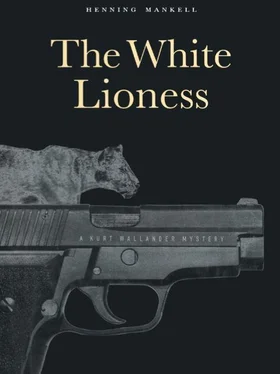Henning Mankell - The White Lioness
Здесь есть возможность читать онлайн «Henning Mankell - The White Lioness» весь текст электронной книги совершенно бесплатно (целиком полную версию без сокращений). В некоторых случаях можно слушать аудио, скачать через торрент в формате fb2 и присутствует краткое содержание. Жанр: Полицейский детектив, на английском языке. Описание произведения, (предисловие) а так же отзывы посетителей доступны на портале библиотеки ЛибКат.
- Название:The White Lioness
- Автор:
- Жанр:
- Год:неизвестен
- ISBN:нет данных
- Рейтинг книги:5 / 5. Голосов: 1
-
Избранное:Добавить в избранное
- Отзывы:
-
Ваша оценка:
- 100
- 1
- 2
- 3
- 4
- 5
The White Lioness: краткое содержание, описание и аннотация
Предлагаем к чтению аннотацию, описание, краткое содержание или предисловие (зависит от того, что написал сам автор книги «The White Lioness»). Если вы не нашли необходимую информацию о книге — напишите в комментариях, мы постараемся отыскать её.
The White Lioness — читать онлайн бесплатно полную книгу (весь текст) целиком
Ниже представлен текст книги, разбитый по страницам. Система сохранения места последней прочитанной страницы, позволяет с удобством читать онлайн бесплатно книгу «The White Lioness», без необходимости каждый раз заново искать на чём Вы остановились. Поставьте закладку, и сможете в любой момент перейти на страницу, на которой закончили чтение.
Интервал:
Закладка:
He avoided thinking about the money awaiting him. He had to carry out his mission first.
He raised his rifle, put his eye to the telescopic sight and watched Nelson Mandela coming to the podium. He had made up his mind to shoot at the first opportunity. There was no reason to delay. He put down the gun and tried to relax his shoulders, taking deep breaths at the same time. He felt his pulse. It was normal. Everything was normal. Then he raised the rifle again, placed the butt against his right cheek and closed his left eye. Nelson Mandela was standing just below the podium. He was partly shielded by other people. Then he broke away from the group and strode toward the microphone. He raised his arms over his head like a victor. His smile was very wide.
Sikosi Tsiki pulled the trigger.
But a fraction of a second before the bullet shot out of the barrel of the rifle at tremendous speed, he felt a thump on his shoulder. He couldn’t stop his finger on the trigger. The shot rang out. But the thump had nudged him nearly five centimeters. That meant the bullet did not even hit the stadium, but landed on a parked car on a street a long way away.
Sikosi Tsiki turned around.
There were two men, breathing heavily and staring at him.
Both had pistols in their hands.
“Put down your gun,” said Borstlap. “Slowly, carefully.”
Sikosi Tsiki did as he was told. He had no choice. The two white men would not hesitate to shoot, he could see that.
What had gone wrong? Who were they?
“Place your hands on your head,” said Borstlap, handing Scheepers a pair of handcuffs. He stepped forward and locked them around Sikosi Tsiki’s wrists.
“Get up,” said Scheepers.
Sikosi Tsiki stood up.
“Take him down to the car,” said Scheepers. “I’ll be there in a moment.”
Borstlap led Sikosi Tsiki away.
Scheepers stood listening to the cheering from the stadium. He could hear Nelson Mandela’s unmistakable voice over the loudspeakers. The sound seemed to come from very far away.
He was soaked in sweat. He could still feel traces of the horror he had felt when it seemed they wouldn’t find the man they were looking for. The sense of relief had still not hit him.
It struck him that what had just happened was a historic moment. But it was a historic moment that nobody would ever know about. If they had not managed to get up the hill in time, if the stone he had thrown at the man in desperation had missed, another historic moment would have taken place. And that one would have been more than just a footnote in the pages of history. It could have sparked off a bloodbath.
I am an Afrikaner myself, he thought. I ought to be able to understand these crazy people. Even if I don’t want it that way, they are my enemies today. Maybe they haven’t really understood deep down that the future of South Africa will force them to reassess everything they’ve been used to. Many of them will never manage that. They would rather see the country destroyed in an explosion of blood and fire. But they will not succeed.
He gazed out over the sea. As he did so, he wondered what he was going to say to President de Klerk. Henrik Wervey was also expecting a report. In addition he had an important visit to make to a house in Bezuidenhout Park. He was looking forward to meeting the two women again.
What would happen to Sikosi Tsiki, he had no idea. That was Inspector Borstlap’s problem. He put the rifle and the cartridges back into their case. He left the metal frame where it was.
Suddenly he thought of the white lioness lying on the river bank in the moonlight.
He would suggest to Judith they should pay another visit to the safari park soon.
Maybe the lioness would still be there.
He was deep in thought as he descended the hillside.
He had realized something that had not been clear to him before. At last he realized what the white lioness in the moonlight had meant to him.
First and foremost he was not an Afrikaner, a white man.
He was an African.
Epilogue
Parts of this story are set in South Africa, a country which has long been poised on the brink of chaos. The potential social upheaval and the internal human trauma have reached a point where many fail to see any possible outcome beyond an inevitable apocalyptic catastrophe. On the other hand, one cannot deny hopeful signs: the racist-controlled South African empire will collapse in the foreseeable future. At this writing, June 1993, a preliminary date has been fixed for the first free elections in South Africa: April 27, 1994. In Nelson Mandela’s words: “a watershed has finally been reached. In the long term, the outcome can already be predicted, albeit with the natural reservations that apply to all political prophesies: the establishment of a democratic society based on the rule of law.”
In the short term the outcome is less certain. The understandable impatience of the black majority and the active resistance of the white minority is leading to increased violence. No one can state with certainty that civil war is inevitable. Nor can anyone state that it can be avoided. It could be that uncertainty is the only certainty.
Many individuals have contributed-sometimes without realizing-to the South African sections of the novel. Had it not been for Iwor Wilkins and Hans Strydom’s essential work in exposing the realities behind the Afrikaner secret society the Broederbond, its secrets would have been concealed from me as well. Reading Graham Leach’s writings on Boer culture was also a veritable adventure. And to round things off, Thomas Mofololo’s stories cast light on African customs, not least with regard to the spirit world.
There are many others whose personal testimony and experiences have been significant. I thank them all, without naming individuals.
This is a novel. That means the names of characters and places, and also the timing, are not always authentic.
The conclusions, and indeed the story as a whole, are my own responsibility. No one apart from myself, named or unnamed, should be blamed for any shortcomings.
Maputo, Mozambique, June 1993
Henning Mankell.
Интервал:
Закладка:
Похожие книги на «The White Lioness»
Представляем Вашему вниманию похожие книги на «The White Lioness» списком для выбора. Мы отобрали схожую по названию и смыслу литературу в надежде предоставить читателям больше вариантов отыскать новые, интересные, ещё непрочитанные произведения.
Обсуждение, отзывы о книге «The White Lioness» и просто собственные мнения читателей. Оставьте ваши комментарии, напишите, что Вы думаете о произведении, его смысле или главных героях. Укажите что конкретно понравилось, а что нет, и почему Вы так считаете.












